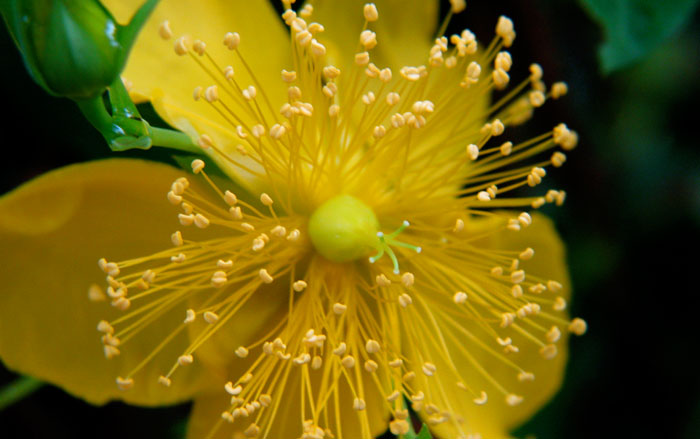
For some people, though, these antidepressants are either ineffective, or have bothersome side effects. For patients who prefer alternatives, it’s good to have a few extra tools in the tool belt. Here are some of the more commonly used and better-studied alternatives for traditional pharmaceutical antidepressants.
1. S-Adenosylmethionine, or SAMe
SAMe has been shown to be an effective treatment for depression when used as a sole agent, and also when used with an SSRI as an augmentation strategy (some citations if you’re interested: 1, 2, 3, 4).
SAMe is a methyl donor, meaning that it acts as a substrate for dozens of chemical reactions in the body, including the synthesis of neurotransmitters that are important in maintaining mental health. It tends to be stimulating, so can be especially helpful if you have the type of depression where you feel slowed down and tired. Most people start at a low dose and work their way up to 800mg twice a day. It has to be taken on an empty stomach to be properly absorbed.
Side effects are generally mild and include stomach upset, nausea, sweating, anxiety, and headache. Similar to pharmaceutical antidepressants, it should be avoided in patients with Bipolar Disorder who are not on a mood stabilizer, as it can induce mania.
The primary downside is the cost. No matter how much you bargain hunt, you will probably be paying $80+ for your monthly supply. However, for people unable to tolerate traditional pharmaceutical antidepressants because of side effects (including the unfortunately common sexual side effects), SAMe can be a good alternative.
2. Inositol
Inositol, a sugar alcohol that is vital in the 2nd messenger system for numerous neurotransmitter reactions, has evidence supporting its use for depression, OCD (obsessive-compulsive disorder), and panic disorder (citations: 1, 2, 3).
Inositol started being tested as a treatment for depression after it was noted in studies that people with depression tended to have lower concentrations of inositol in their cerebrospinal fluid. It can be used on its own, or in conjunction with traditional antidepressants and mood stabilizers (it is not known to have any drug-drug interactions).
Doses typically range from 2-6 grams twice a day or three times a day, aiming for a total daily dose of 12 grams a day. Similar to antidepressants, it can take up to 4-6 weeks for the benefits to kick in.
Side effects tend to be mild and include nausea, gas, sleepiness, dizziness, and headaches. Care should be taken in Bipolar Disorder given the potential for inositol to trigger mania. It should not be used in pregnancy as it can potentially stimulate uterine contractions.
3. 5-Hydroxytryptophan, or 5-HTP
5-HTP, which is extracted from the Griffonia simplicifolia plant, is a precursor in the synthesis of serotonin, and is thought to treat depression through increasing production of serotonin in the brain.
While 5-HTP is not as well-studied as some of the other supplements on this list, I’m including it because many patients report finding it helpful, and many integrative psychiatrists recommend it. The most recent study I came across was a double-blinded, controlled study done in India which found similar efficacy of 5-HTP and fluoxetine (Prozac). Here is the Cochrane review of 5-HTP for depression, which found the evidence positive but inconclusive.
5-HTP can be sedating, making it helpful for people who have an anxious type of depression, or who have trouble sleeping. Dosing is typically 200-400mg daily divided twice a day.
4. St John’s Wort
So you’ve probably already heard of St John’s Wort, but I wanted to include it on the list anyway to go over some of the pros and cons of this commonly used herbal antidepressant.
Over-the-counter St John’s Wort is cultivated from the Hypericum Perforatum plant. It is unclear exactly what the active part of the plant is, and different sources mention both hyperforin and hypericin as active ingredients. It is thought to work by altering brain neurotransmitter levels through inhibiting reuptake of seratonin, dopamine, norepinephrine, glutamate and GABA. A common starting dose is 300mg 3 times a day (of standardized 0.3% hypericin or 2-5% hyperforin extract) and a maintenance dose of 300-600mg daily.
There is a large literature indicating that St John’s Wort is as effective as traditional pharmaceutical antidepressants for mild and moderate depression (this Cochrane review summarizes it). It is unclear if it is as effective for severe depression. Common side effects include headache, nausea, and rash.
Despite its well-documented effectiveness, though, there is a significant downside to St John’s Wort. It interacts with a key enzyme system of the liver, which can significantly alter the blood levels of other medications, including digoxin, warfarin, antiretrovirals, and oral contraceptive pills. It also can be dangerous to use with pharmaceutical antidepressants. For that reason, St John’s Wort may not be appropriate for some people.
If you’re considering using any of these supplements, make sure to talk to your doctor about if they’re appropriate for you, especially if you’re taking other medications. Don’t take this article as medical advice and start dosing yourself up.
If you have any personal experience either recommending or using these supplements, I’d love to hear about it in the comments!
***
Photo by Audrey


Is the amount of inositol found in many energy drinks at the level of a therapeutic dosage? Do you know of any over the counter supplements? I’m not suffering from depression by any means, but do know people who are. Got the disclaimer about talking to a physician first.
Hey Larry, I would avoid energy drinks because the caffeine and other stimulants can make depression and anxiety worse. I recommend people purchase the powder form from a health food store and then mix it with water.
Hi Elena, Thanks for your blog, very helpful. I’d like to suggest a topic for a post on alternative / plant based treatments for ADHD.
I’ve personally had good luck with cutting out gluten, taking a lot of fish oil, and intense exercise (which I think actually helps more with anxiety, but helps me be present thereby anyhow). But I’m working on a book now and often have a hard time getting the gears to kick in and I’m jealous of people with ADHD who can pop an Adderol to help write. I much prefer to put plant based stuff in my body versus patented lab products. I know, caffeine, but that blasts me off the rails and I wind up feeling anxious and just scattering more widely and quickly.
Would love to hear your thoughts on this topic at some point. Thanks again and take care!
Unfortunately, Kay, I’m thinking some resort to a medication [as opposed to an herbal that would be sufficient] because it’s covered under insurance and the copay is actually cheaper/more affordable compared to the cost of the supplement.
The other consideration, again [here in the US], is that our herbal products are not regulated like they are in other countries. Not all companies are ethical and/or accidents happen. Some products can be adulterated with harmful products [eg. remember headlines of a young woman who died from liver damage she sustained from a commonly used OTC taken for anxiety].
Along the same lines [that herbals don’t always = better] Energy drinks might be as effective for someone as taking Adderall; but the side-effects may actually be worse [eg. might require a large caffeine dose to be effective while the effect wears off sooner; hence, requiring an even higher dose with a higher side effect profile]. The energy drinks, depending on content, can significantly raise blood pressure, for example. In that respect, Adderall could actually be safer. One must also consider other side effects, though; irritability and mood effects and/or the “crash” of the Adderall which could be detrimental to some; particularly if one is not on the proper dosage].
[sorry Elena….you could interject anytime!….]
See Kay, that’s a good idea, thanks for the suggestion! You mention some good options, and another I would add is neurofeedback, which has a lot of positive evidence in the treatment of ADHD.
Hey Sharon, great points, thanks for adding to the convo! You’re right that traditional pharmaceuticals are almost always covered by insurance, while these supplements aren’t. While SAMe costs $80+ a month, you can pick up generic Prozac for $4 a month, even without insurance.
Also very true that the regulations for supplements are not very stringent. I’ve heard that European brands of St John’s Wort are superior to US ones (these are the brands used in most of the studies). I read an article recently saying that a large percentage of US supplements have unsafe levels of heavy metals like lead and mercury. I like the resources consumerlabs.com, which does independent lab testing of common supplements.
Thanks for the response, very interesting re: neurofeedback for ADHD. Poking aroung on pubmed and google is interesting and confusing on this. Seems the American Pediatric Association is calling it evidence based (https://psychcentral.com/blog/archives/2013/06/10/neurofeedback-therapy-an-effective-non-drug-treatment-for-adhd/).
But a recent double blind RCT showed it no better than active placebo (https://www.ncbi.nlm.nih.gov/m/pubmed/24021501/).
It sounds very interesting and kind of fun and I might just have to try it to see how it goes for me as an N of 1.
Anyhow, again, would love to hear your thoughts on this at some point and thanks for the suggestion.
I can’t speak for the other supp’s, but [at least in the US] you have to be careful. I know St. John’s Wort “lost effectiveness” about the same time there was a change in brand. Herbals aren’t regulated here like they are in Europe. It helps to find as reputable a brand you could find [that works] and stick with it. On the flip side, it would be a bummer to decide that an herbal remedy isn’t helpful when it is actually because of the poor quality of the particular brand or batch you purchased.
Oh, and don’t forget sun sensitivity [for psychotropics, in general, but in the “some more than other” category, this one definitely falls in the “more” one. Aside from that, with all of the potential for interactions you have mentioned, this option might be worth passing up.
I did try St. John’s Wort several years ago for depression and had a dreadful experience. I plunged much deeper into despair and destroyed nearly all of my photographs in what I now refer to as my depressive purge. Luckily, I had the wherewithal to stop it at once and my condition improved. I since have been treated for Graves Disease which I believe was the cause and/or contributor to decades of PMS – anxiety-depression which is considerably improved, but not before going through hell from the fallout of radioactive iodine treatment AND menopause. – No energy, no brains, not enough monitoring. At 57 I feel I’m just starting to have 1/2 a chance at living/coping like a “normal” person. And yes, I presently take 2 common “happy pills” that haven’t backfired on me yet – citalopram and wellbutrin.
I would add the caution, in the 5-HTP category, that this supplement CANNOT be taken with anti-depressants…an accupuncturist, treating me, five years ago, was unaware of the dangers, and I immediately went into akathesia and symptoms of seratonin overdose…
Also, I’m wondering what your thoughts are, regarding Deplin?